Events 2025-2026
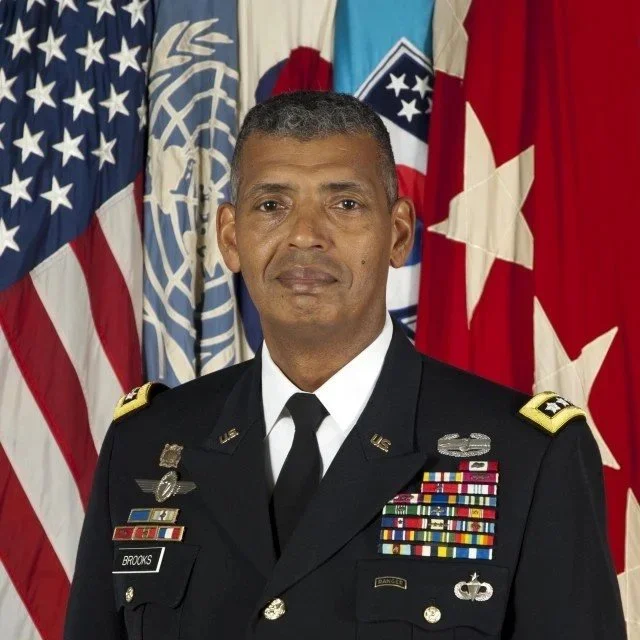
General Vincent Brooks – Security Challenges from the Indo-Pacific and Beyond, Memorial Lecture in Honor of General William Crouch ’63
General Brooks (ret.) will draw from his deep military experience and regional expertise to share his thoughts on America’s greatest security challenges in the Indo-Pacific Region and beyond. This Memorial Lecture honors the late General William Crouch ‘63, former Chair of the Keck Center Board of Governors. General Vincent Brooks, a now retired four-star general with extensive military experience in the Indo-Pacific and the Korean peninsula, believes that the quality of American foreign policy in the region depends greatly upon the quality of our understanding of the issues and history. He advocates for our assumptions being tested, for relationships being refreshed, and for perspectives being informed by the ways others see the region.
Location: Athenaeum

Hot Topic Discussion on US-Venezuela Relations
Register here for a Hot Topic discussion of recent U.S. military activity and buildup in the Caribbean and the implications for U.S.-Venezuela relations. We will be joined by experts to analyze the ways in which U.S. intervention may impact Venezuela’s stability and political future.
Location: Kravis 102
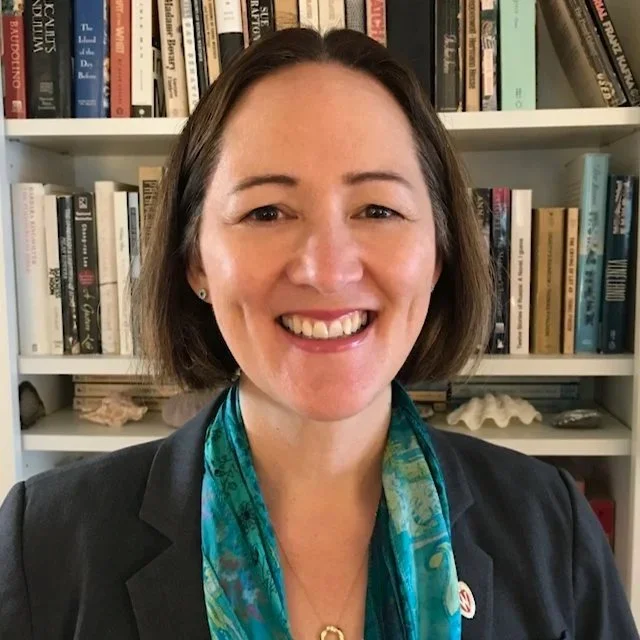
Dr. Yoshiko Herrera - Russia's War on Ukraine
Dr. Herrera will examine the question of why Russian President Vladimir Putin launched a full-scale war in 2022. The answer does not seem to be related to many of the usual explanations that IR scholars privilege, like economic interests or threats to security. Instead, Russia’s imperial ambitions and sense of Russian national identity heavily shaped President Putin’s decision to launch the full-scale invasion. Dr. Herrera will shed light on these topics and provide a sense of how Russia’s invasion of Ukraine demonstrates the ways in which national identity and war intersect.
Location: Athenaeum
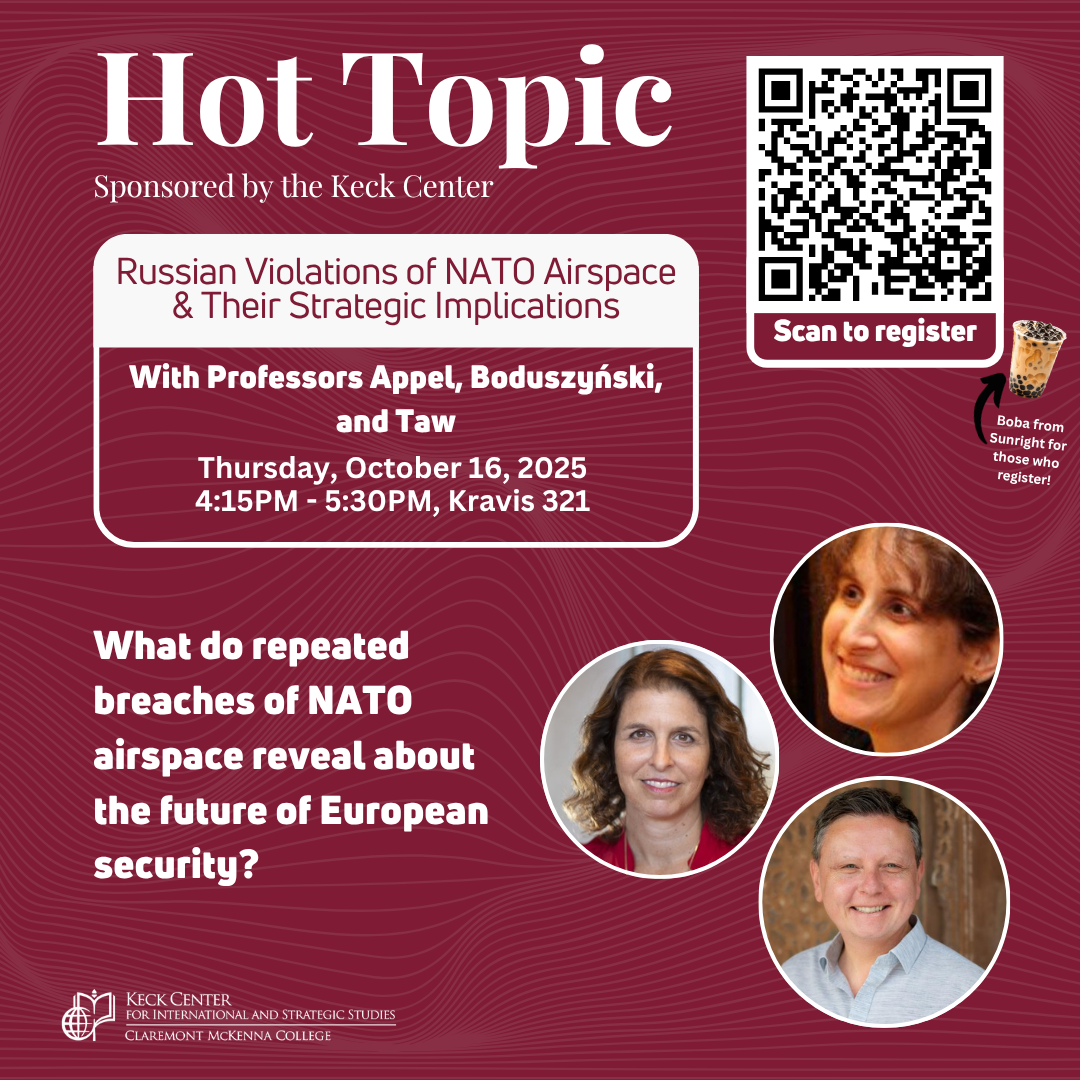
Hot Topic Discussion on Russian Violations of NATO Airspace and Their Strategic Implications
The Keck Center will host a hot topic discussion of recent, repeated violations of NATO airspace by Russia and their strategic implications for European Defense. Professors Hilary Appel (CMC), Mietek Boduszynski (Pomona), and Jennifer Taw (CMC) will be in discussion and will answer student questions. Boba from Sunright will be provided for those who register.
Location: Kravis 321

Professors Minxin Pei and Peter Uvin - China in Africa Saturday Salon
The Keck Center is co-sponsoring a Saturday Salon on China in Africa with the Open Academy, featuring CMC’s own Professors Minxin Pei and Peter Uvin. Professors Pei and Uvin will discuss the role of Chinese investment and involvement in Africa, along with its implications for the continent, Chinese power, and the Global Order. The salon will be followed by dinner with the opportunity to continue robust discussion.
Location: Kravis 321
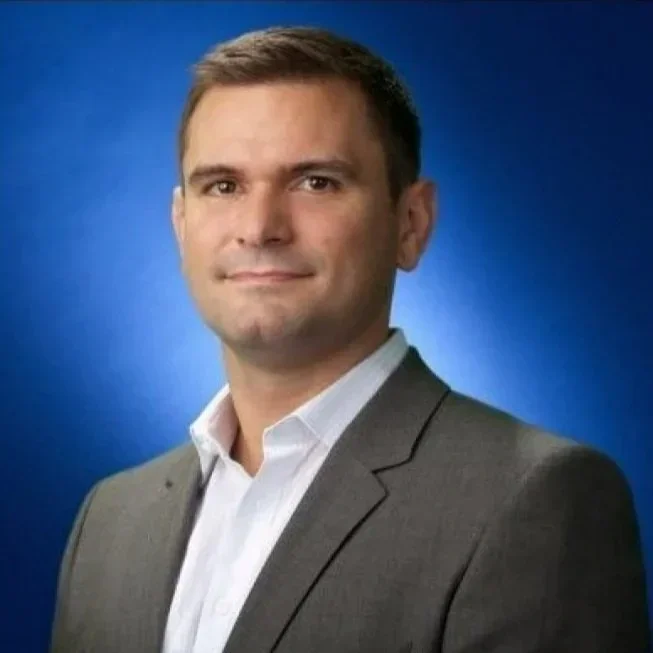
Christian Oestlien '99 - Careers in the Tech Sector
Christian Oestlien, CMC ‘99 and Vice Chair of the Keck Center Board of Governors, will share insights about his successful trajectory from being an international relations and economics major at CMC to product management at YouTube. He is Vice President for Product Management, and has led teams across YouTube TV, Sports, Video Infrastructure, Privacy, and Identity. He previously worked at Google, Twitter, and Yahoo. This student Q&A will address how to conceptualize the changing nature of technology jobs, opportunities and challenges from AI, and the potential of a CMC education.
Location: Bauer Center North, Founders Room
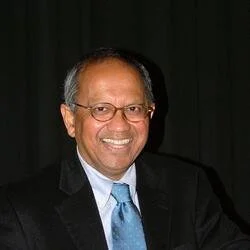
Dr. Šumit Ganguly - The Unresolved Question of Kashmir
The dispute between India and Pakistan over the state of Jammu and Kashmir has persisted since the emergence of the two countries in 1947 following the end of the British Indian Empire in 1947. The dispute has resulted in three wars (1947-48, 1965 and 1999) and multiple crises. Multiple attempts at conflict resolution at multilateral and bilateral levels have failed to end this protracted conflict. This lecture will trace the origins of the dispute, discuss the attempts at conflict resolution and suggest possible scenarios under which it could eventually come to a close.
Location: Athenaeum
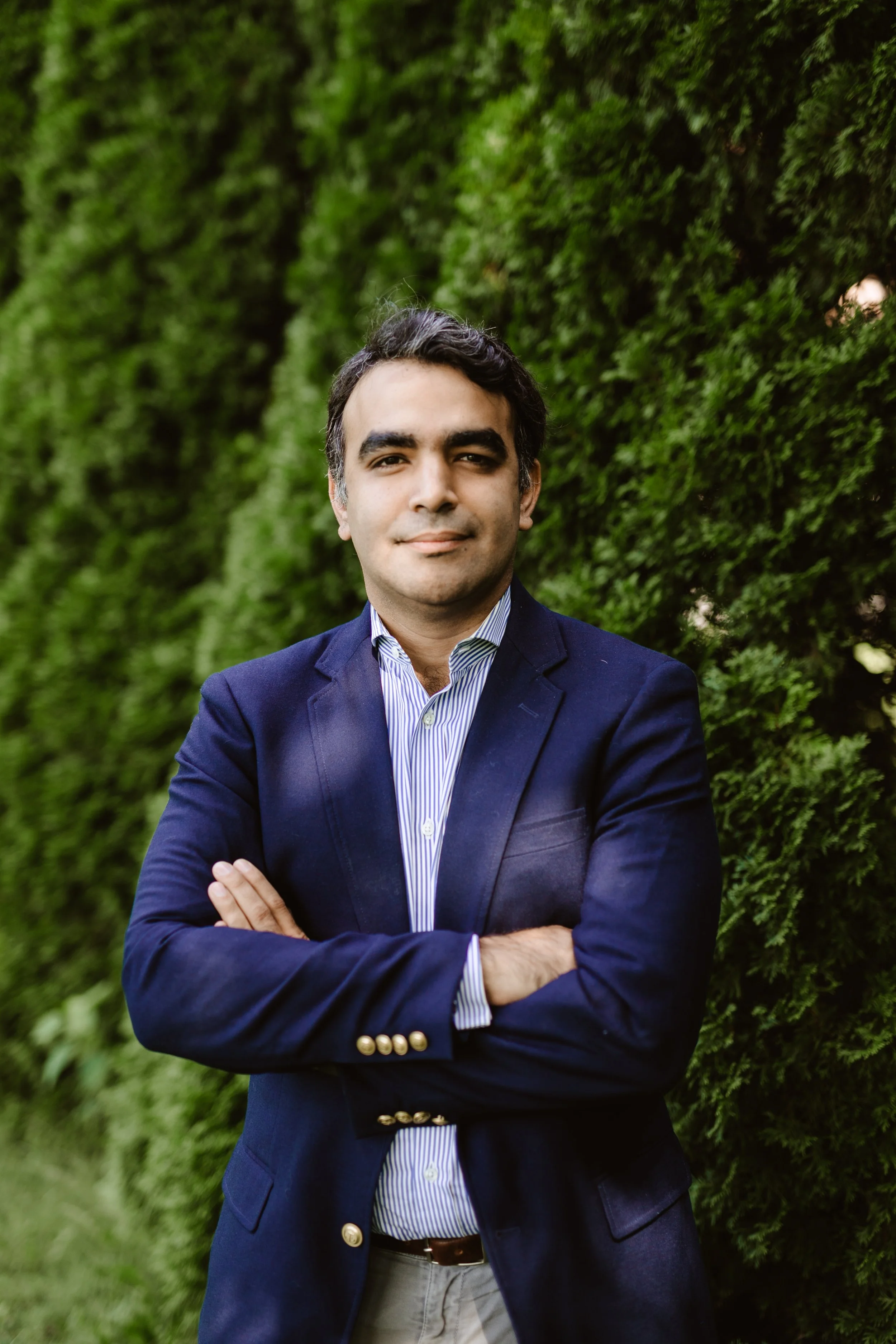
Dr. Hussein Banai - Iran's Rise and Retreat in the Shadow of American Missteps
Come to the Athenaeum to learn about the dramatic rise and gradual unraveling of Iran’s regional influence between 2005 and 2025. This talk will discuss how Iran leveraged regional instability to project power, only to face coordinated containment efforts by Israel and the U.S., and ultimately find itself in geopolitical retreat.
Location: Athenaeum

Celebration of Graduating IR Seniors
Come Join Us on the 4th Floor North of Kravis with your Graduation Guests!

State of Senior Thesis
Come join the Keck Center and the Claremont International Relations Society for State of Senior Thesis, the annual event where students present their international relations-related thesis research! Food will be provided!
Location: Gann Quadrangle, the lawn outside of the Kravis Center

Technology and the Rise of Great Powers
Dr. Jeffrey Ding teaches in the Political Science Department at George Washington University. He was previously a fellow at the Center for International Security and Cooperation, part of Stanford’s Institute for Human-Centered Artificial Intelligence and has also conducted research at Georgetown’s Center for Security and Emerging Technology and Oxford’s Centre for the Governance of AI. Professor Ding received his Ph.D. from the University of Oxford, where he studied as a Rhodes Scholar. He is an expert on great power competition and cooperation in emerging technologies, the political economy of innovation, and China’s scientific and technological capabilities.
Location: The Athenaeum

Discussion with Omar Dajani
Join us at the Keck Library for a small group discussion with Omar Dajani, who will be giving a talk at the Athenatuem that evening titled Palestine: What Now?
Omar Dajani is the Carol Olson Professor of International Law at the McGeorge School of Law, University of the Pacific, a former legal adviser to the PLO in peace talks with Israel, and the joint board co-chair of A Land for All, an Israeli-Palestinian peace organization. His scholarship, which explores how legal norms operate in the context of international conflict resolution processes and political transitions, focuses on Israel-Palestine. His current research focuses on what’s next for the states of the Middle East. He is exploring the status and protection of ethnic and religious minorities and considering the extent to which federalism and other forms of decentralization offer solutions to ethno-national conflicts in the region.

US Strategy in the Indo-Pacific Region
Memorial Lecture in Honor of the late General Crouch, former Chair of the Keck Center Board of Governors.
Admiral Harry Harris was the U.S. Ambassador to South Korea from 2018- 2021. Previously, he served 40 years in the U.S. Navy, retiring in June 2018. The first Japanese-American to hold a four-star rank in the Navy, he commanded the U.S. Indo-Pacific Command, U.S. Pacific Fleet, U.S. Sixth Fleet, and Naval Striking and Support Forces NATO. A 1978 graduate of the U.S. Naval Academy, he holds master's degrees from Harvard's Kennedy School of Government and Georgetown's School of Foreign Service. He is a member of the Council on Foreign Relations and the Council of American Ambassadors.
Location: The Athenaeum

Tea Talk: IR Internships in Uncertain Times
Come hear from seniors about first- and second-year internship opportunities in the sphere of international relations and how to make the most of your summers! Boba will be provided.
Location: Keck Center Library (center of the 3rd floor of the Kravis Center)

The Weaponization of Migration and its Political and Geopolitical Implications
As allegations of the weaponization of migration proliferate on both sides of the Atlantic, Professor Kelly M. Greenhill will explore a triad of intertwined and self-reinforcing challenges that inform, affect and complicate international migration management and border security: 1) the weaponization of migration for political, economic and/or military gain; 2) the politicization and exploitation of fears of migration for domestic political gain; and 3) the weaponization of the politicization of migration, in the form of foreign hostile influence operations that rely on the deployment of rumors, conspiracy theories, and other forms of what Greenhill calls "extra-factual information". Drawing upon evidence from recent and ongoing cases, Greenhill will also discuss how each of these three distinct phenomena can exacerbate the others, creating vicious feedback loops. leaving target states less secure and more vulnerable to future acts of migration predation and endangering the human rights of the true victims of migration weaponization, the displaced themselves.
Dr. Kelly Greenhill is a Professor of Political Science and International Relations at Tufts University (with a secondary appointment at the Tisch College for Civic Life) and a Visiting Professor and Resident Senior Fellow at MIT. She is a leading expert on mass migration and forced displacement, best known for her award-winning book Weapons of Mass Migration: Forced Displacement, Coercion, and Foreign Policy, which explores how states use forced migration as a tool of foreign policy. Her research has shaped academic and policy debates, with her work cited in U.S. Supreme Court cases, international policy briefs, and major media outlets like The New York Times and Foreign Affairs. In addition to her roles at Tufts University and MIT, she has advised organizations including the United Nations, NATO, and the World Bank, and continues to advance scholarship on the geopolitics of migration through projects like the Diplomacy of Forced Migration Dataset.
Location: Athenaeum

The New Geopolitical Divide: Eastern Europe After Russia's Invasion of Ukraine
Join the Keck Center for a talk on the war in Ukraine for the third anniversary of the full-scale invasion.
Location: Kravis Center 345
Sign up here!

Careers in Public Interest and Tech Law
The CMC alumni on this panel will discuss their experience in law school and their exploration of different law careers in the early years after getting their law degree.
Sign up here: https://forms.gle/Jaebmip4b7YbNjfz9

Israel-Gaza War: Escalation and Regional Ramifications
Andrew Miller, Senior Fellow at Center or American Progress and former Deputy Assistant Secretary of State for Israeli and Palestinian Affairs. A veteran diplomat and foreign policy official with more than a decade of experience, Miller was among the most senior officials focused full time on the Israel-Hamas war in Gaza. He played a key role in discussions with U.S. partners about post-conflict governance, security, and reconstruction arrangements.
Location: Athenaeum POSTPONED to NOV 20!

Israel's Escalating War Against Iran's Proxies
Join professors Hicham Bou Nassif, Shervin Malekzadeh, and Yitzhak Brudny for a moderated discussion and dinner panel discussing Israel-Iran proxy wars in the Middle East.
Apply to join us at the event here.

The Impact of Trump’s Victory on US Foreign Policy
Professors Koch, Pei, Appel, Taw and other international relations faculty will discuss the impact of the results of the 2024 United States presidential election on America’s place in the world.
Sign up here!
Location: Kravis 102

Graduate School Panel
The Keck Center is hosting graduate school panel to provide insights into advanced degree programs in international relations and related fields. Panelists will include alumni from prestigious institutions, offering guidance on admissions and career prospects. This event aims to help students navigate the application process and explore diverse graduate pathways in global affairs.

Politics of the Past and Politics of the Future
Join Masha Gessen, one of the most trenchant observers of modern democracy, for a wide-ranging discussion of the past and future of global politics. Gessen is a journalist and bestselling author who has covered political subjects from Russia, autocracy, L.G.B.T. rights, Vladimir Putin, and Donald Trump. Gessen's latest book is Surviving Autocracy, a bracing overview of the calamitous trajectory of American democracy under the Trump administration. As The New York Times Book Review noted in their review, “When Gessen speaks about autocracy, you listen.” Their understanding of the events and forces that have wracked Russia in recent times is unparalleled. Winner of the National Book Award, The Future Is History: How Totalitarianism Reclaimed Russia follows the lives of four people born at what promised to be the dawn of democracy, against the machinations of the regime that would crush them all. Gessen’s other books include the New York Times bestseller, The Man Without a Face: The Unlikely Rise of Vladimir Putin, and Words Will Break Cement: The Passion of Pussy Riot. An opinion writer at The New York Times, Gessen is the first Distinguished Professor at Craig Newmark Graduate School of Journalism at CUNY, and is a founder of the Russian Independent Media Archive, a digital archive focused on preserving the last two decades of independent Russian journalism. They live in New York City.
Location: Athenaeum

The Russia-Ukraine War and the Politics of Memory
Why does Russian president Vladimir Putin so often draw on WWII analogies to justify Russia’s war on Ukraine? How does the Putin regime use memory politics to explain Russia’s war aims and Ukraine’s resistance to them, and why do these claims have resonance with the Russian public? In this talk, Professor Juliet Johnson (McGill University) will focus on the Russia-Ukraine war to explore how and why the Putin regime has strategically used the past to legitimize its authoritarian, aggressive, and anti-Western turn.
Juliet Johnson is Professor in the Department of Political Science at McGill University, Fellow of the Royal Society of Canada, former President of the Association for Slavic, East European, and Eurasian Studies (2023), and former Director of the international research network Between the EU and Russia: Domains of Diversity and Contestation (2015-2023). Her research focuses on the politics of money and on memory politics, particularly in post-communist Europe. Her publications include Developments in Russian Politics (Duke 2024), Priests of Prosperity: How Central Bankers Transformed the Postcommunist World (Cornell 2016), A Fistful of Rubles: The Rise and Fall of the Russian Banking System (Cornell 2000), and numerous scholarly and policy-oriented articles.
Location: Athenaeum

India’s 2024 Election: Trials and Tribulations of a Multiethnic Democracy
In this year of elections, what can we learn about India and from India given its recent national elections? For example, what do the world’s largest and longest elections tell us about democracy? The quality and survival of democracy in India have attracted much scrutiny. This presentation will draw on the 2024 Indian election campaign and its outcomes to offer some reflections on themes related to democratic politics.
Professor Amit Ahuja is an Associate Professor of Political Science at University of California, Santa Barbara. His research focuses on the processes of inclusion and exclusion in multiethnic societies. He has studied this within the context of ethnic parties and movements, military organization, intercaste marriage, and skin color preferences in South Asia. Professor Ahuja’s book, Mobilizing the Marginalized: Ethnic Parties without Ethnic Movementspublished by Oxford University Press was the winner of the 2020 New India Foundation Kamaladevi Chattopadhyay Book Prize. He has coedited a volume with Devesh Kapur, Internal Security in India: Violence, Order, and the State published by Oxford University Press. He is currently working on a book-length project titled, Building National Armies in Multiethnic States. In 2022-23, he is a fellow at the Woodrow Wilson International Center in Washington DC. Professor Ahuja was awarded The Margret T. Getman Service to Students Award in 2015. Professor Ahuja’s research has been supported by the National Endowment for the Humanities and the American Institute of Indian Studies, the National Bureau of Asian Research and the Woodrow Wilson Center for International Scholars, the Hellman Family Foundation, the University of California at Santa Barbara, and the University of Michigan.
Location: Athenaeum

The Art of Diplomacy: How American Negotiators Reached Historic Agreements that Changed the World
Ambassador Stuart Eizenstat will discuss his recent book, The Art of Diplomacy: How American Negotiators Reached Historic Agreements that Changed the World (2024), in a talk co-sponsored by the Keck Center for International and Strategic Studies and the Mgrublian Center for Human Rights.
Location: Athenaeum

Rastafari and the War Against Cannabis: Transnational Moral Economies and Black Self- Determination
Scholars often point to the 1990s as the ideological high-tide of neoliberal globalization. More recently, however, populism has brought back into politics – on both the left and right - a consideration that the economy should be a moral realm, that is, a realm wherein purely transactional relationships of the neoliberal kind must give way to broader social obligations and reciprocities. If there is any economy that deserves the label “popular” – in terms of its widespread and global use and its association with the masses as opposed to the elites – it is surely the Cannabis economy. In contrast to the principles of neoliberal economy, Cannabis culture comprises a dense weave of collective norms, reciprocities, and obligations that govern not only how the plant is cultivated but how it is used and even sold. Rastafari are the exemplars of this culture, promoting a transnational moral economy of black self-determination. But the Rastafari use of Cannabis has been criminalized as part of a war on drugs with racist predicates. This presentation historically tracks the war across Caribbean and North American spaces, and via spiritual, cultural, economic and political dimensions, in order to examine a moral economy that might help us think differently about alternatives to neo-liberalism in a populist era.
Professor Robbie Shilliam is Professor and Chair of the Political Science Department at Johns Hopkins University, He is a leading scholar of postcolonial politics and racial politics in the field of International Relations. He has authored numerous books including Race and the Undeserving Poor: From Abolition to Brexit (2018); Decolonizing Politics (2021), The Black Pacific: Anticolonial Struggles and Oceanic Connections (2015), and German Thought and International Relations (2009) and co-edited multiple volumes including Race and Racism in International Relations: Confronting the Global Colour Line (2014). He is co-editor of the Manchester University Press book series Postcolonial International Studies. Professor Shilliam is a long-standing active member of the Global Development section of the International Studies Association, having served as the association's Vice President. Professor Shilliam works with community and academic intellectuals and elders of the Rastafari movement to examine its impact on global affairs. Based on original, primary research, he helped to co-curate a history of the Rastafari movement in Britain, which was exhibited in Ethiopia, Jamaica and Britain.
Location: Athenaeum

Keck, Mgrublian & Salvatori Joint Open House
Learn more about opportunities and how to get involved with the Keck Center, Mgrublian Center, and Salvatori Center. Walk through the centers and chat with students, faculty, and staff, while indulging in delicious treats from popular local eateries/bakeries.
